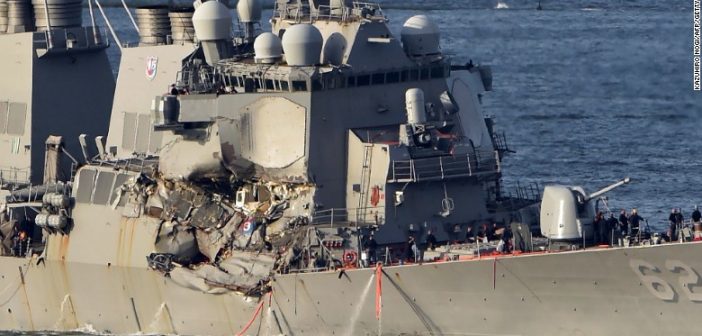The Navy has dropped criminal charges against two top officers of the USS Fitzgerald, the destroyer that collided with a merchant ship on June 17, 2017, off the coast of Japan, resulting in the death of seven American sailors. It issued letters of censure instead.
The charges were dropped against Cmdr. Bryce Benson, the Fitzgerald’s former commander, and Lt. Natalie Combs, the ship’s former tactical action officer. Navy Secretary Richard V. Spencer said he made the decision on the recommendation of Admiral John Richardson, the Chief of Naval Operations.
“This decision is in the best interest of the Navy, the families of the Fitzgerald sailors and the procedural rights of the accused officers,” the Navy said. “Both officers were previously dismissed from their jobs and received non-judicial punishment.”
Meanwhile, ProPublica, the non-profit investigative reporting organization based in New York, published a scathing editorial under the headline, “How the Navy’s Top Commander Botched the Highest-Profile Investigation in Years,” after it published a lengthy report about the Fitzgerald accident and second one, two months later, when another destroyer, the USS John McCain, collided with a merchant ship east of Singapore, killing 10 American sailors. (Read the editorial and the report in the links below.)
The point of the editorial was that Admiral Richardson pre-judged the cases against the ships’ officers, detailing “how the actions of the Chief of Naval Operations helped doom the cases.” Admiral Richardson had told a group of Navy attorneys, “I have seen the entire investigation. Trust me, if you had seen what I have seen, it was negligence.”
Earlier, he told a press conference that in both cases the officers were “at fault” because of their negligence. A judge subsequently said Admiral Richardson violated the officers’ protections against undue command influence.
A preliminary Navy report two months after the McCain accident said that both accidents were “avoidable” and were caused by multiple human errors.
In the Fitzgerald case, at 1:30 a.m. on a clear night, Crystal, a Philippine-flagged container ship, three times the size of the destroyer, hit it on the starboard side. The collision was so violent it sent the Fitzgerald spinning through a 360-degree circle in the next five minutes.
The Navy’s complete investigation of the accident was 13,000 pages long. It said there was no excuse for the crew’s failure to see the approaching container ship, and that officers on watch should have seen it as far as 12 miles away. It said the destroyer’s radars had problems, but the crew should have been able to fix them. It also said that the crew, hampered by manpower and training shortfalls, made serious mistakes, but the crew’s heroic actions saved the ship after the collision.
The ProPublica story, relying on the Navy’s 13,000-page report and its own investigation, “revealed neglect by Navy leadership, serious mistakes by officers – and extraordinary acts of valor and endurance by crew.”
It continued: “The Fitzgerald’s captain selected an untested team to steer the ship at night. He ordered the crew to speed through shipping lanes filled with cargo ships and fishing vessels to free up time to train his sailors the next day. At the time of the collision he was asleep in his cabin.
“The 26-year-old officer of the deck, who was in charge of the destroyer at the time of the crash, had navigated the route only once before in daylight. In a panic, she ordered the Fitzgerald to turn directly into the path of the Crystal.”
ProPublica also reported serious questions about the Fitzgerald’s equipment and readiness. The ship’s radars were in questionable shape, the report said, and it was not clear that the crew knew how to operate them. One radar could not automatically track nearby ships. To keep the screen updated, a sailor had to punch a button 1,000 times an hour. The ship’s primary nav system was run by 17-year-old software.
The ship’s email system for both classified and non-classified material failed repeatedly. Officers used Gmail instead.
The Navy requires destroyers to pass 22 certification tests to prove themselves seaworthy and battle-ready. The Fitzgerald passed just seven. It was not even qualified to conduct its chief mission of anti-missile defense. Read more:
https://www.propublica.org/article/navy-commander-tainted-investigation
https://features.propublica.org/navy-accidents/uss-fitzgerald-destroyer-crash-crystal/




